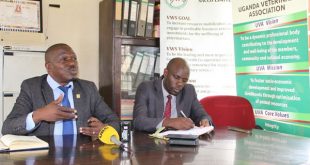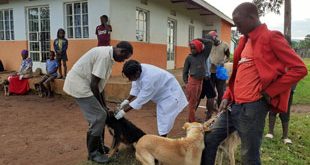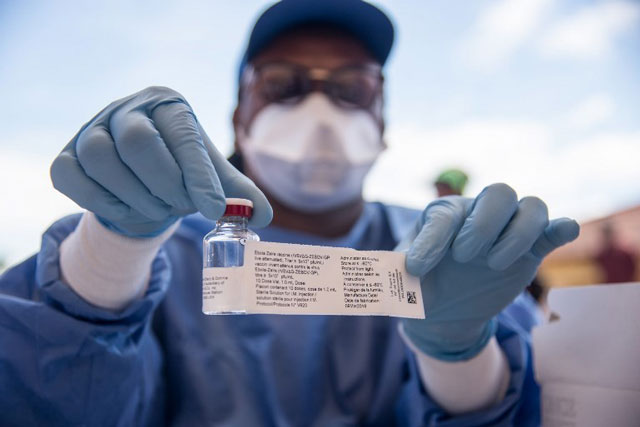
Kampala, Uganda | THE INDEPENDENT | Uganda’s Ministry of Health and the World Health Organisation (WHO) have confirmed a case of Ebola Virus Disease outbreak in Kasese.
“The confirmed case is a 5-year-old Congolese child who traveled from the DRC with his family on 9th June 2019. The child and his family entered the country through Bwera Border post and sought medical care,” the WHO Representative to Uganda Yonas Tegegn Woldemariam wrote on Twitter.
According to Helen Branswell, a senior writer, infectious diseases and global health at StatNews, as many as a dozen members of this family may be ill. They had been placed in an observation centre in DRC but fled across the border to Uganda.
The child was admitted at Kagando hospital then transferred to Bwera Ebola Treatment Unit for management. A confirmation was made today by the Uganda Virus Institute (UVRI).
Minister of Health Ruth Aceng took to TV for a live broadcast of plans to contain the epidemic, including vaccination.
“Uganda has been in preparedness mode ever since the Ebola outbreak was declared in DRC. Now, we move into response mode,” she declared.
She announced that the Ministry of Health and WHO have dispatched a Rapid Response Team to Kasese to start contact, tracing and management of cases that are likely to occur. She said community education and psycho-social support have been intensified.
“The child is under care and receiving supportive treatment at Bwera ETU, and contacts are being monitored. The ministry of health will also undertake vaccination for those who have come into contact with the patient and frontline health workers considered to be at high risk,” Aceng revealed.
Aceng will fly to Bwera from Kampala on Wednesday morning to oversee the response team.
Although there have been numerous previous alerts, this is the first confirmed case in Uganda during the Ebola outbreak on-going in neighbouring Democratic Republic of the Congo.
Ebola virus disease is a severe illness that is spread through contact with the body fluids of a person sick with the disease (fluids such as vomit, feces or blood). First symptoms are similar to other diseases and thus require vigilant health and community workers, especially in areas where there is Ebola transmission, to help make diagnosis.
Interesting #Ebola factoid: Though #Uganda has had 5 previous Ebola outbreaks, none were caused by Ebola Zaire, the strain responsible for the DRC outbreak. In fact, Uganda had the 3rd largest outbreak on record, at Gulu in 2000-01. They have experience with Ebola. pic.twitter.com/OOQwO8rmfi
— Helen Branswell (@HelenBranswell) June 11, 2019
Uganda has been preparing
Uganda has been on high alert since the outbreak in the eastern DRC, where more than 2,000 cases of the highly contagious virus have been recorded, two-thirds of which have been fatal.
After the news broke, endocrinologist and clinical scientist Jack Milln tweeted, encouraging his colleagues in Uganda. ” Thinking of colleagues in Uganda as Ebola spills over. Great preparedness, many vaccinated – Uganda has the capacity to contain the outbreak – a proven track record,” he said.
WHO chief Tedros Adhanom Ghebreyesus hailed Uganda’s preparedness, and said his team is setting up a rapid response team together with local health officials to prevent further spread of the disease.
“I commend Uganda’s ministry of health for responding quickly to the identification of a case of Ebola. Uganda has experience managing Ebola and has been preparing for months for this eventuality. This kind of experience and preparedness is vital to prevent the further spread of the virus,” he said, adding “We are contacting members of the International Health Regulations Emergency Committee and asking them to be on standby.”
Uganda has previous experience managing Ebola outbreaks, most recently in 2012, while in 2000 more than 200 people died in an outbreak in the north of the country.
However, none of the five previous outbreaks were caused by Ebola Zaire, the strain responsible for the DRC outbreak

In preparation for a possible imported case during the current outbreak in DRC, Uganda had since November already vaccinated nearly 4700 health workers in 165 health facilities -including in the facility where the child is being cared for.
Disease monitoring was intensified and health workers trained on recognizing symptoms of the disease. Ebola Treatment Units were also put in place.
Helen Branswell, a senior writer, infectious diseases and global health, says the new case may increase the pressure on the World Health Organization to declare this outbreak a public health emergency of international concern.
“Twice so far a committee of outside experts have met to review the outbreak data and advise the WHO’s Director General, Tedros Adhanom Ghebreyesus, on whether this outbreak constitutes a global health threat. Both times they concluded it did not, pointing specifically to the lack of international spread,” she wrote.
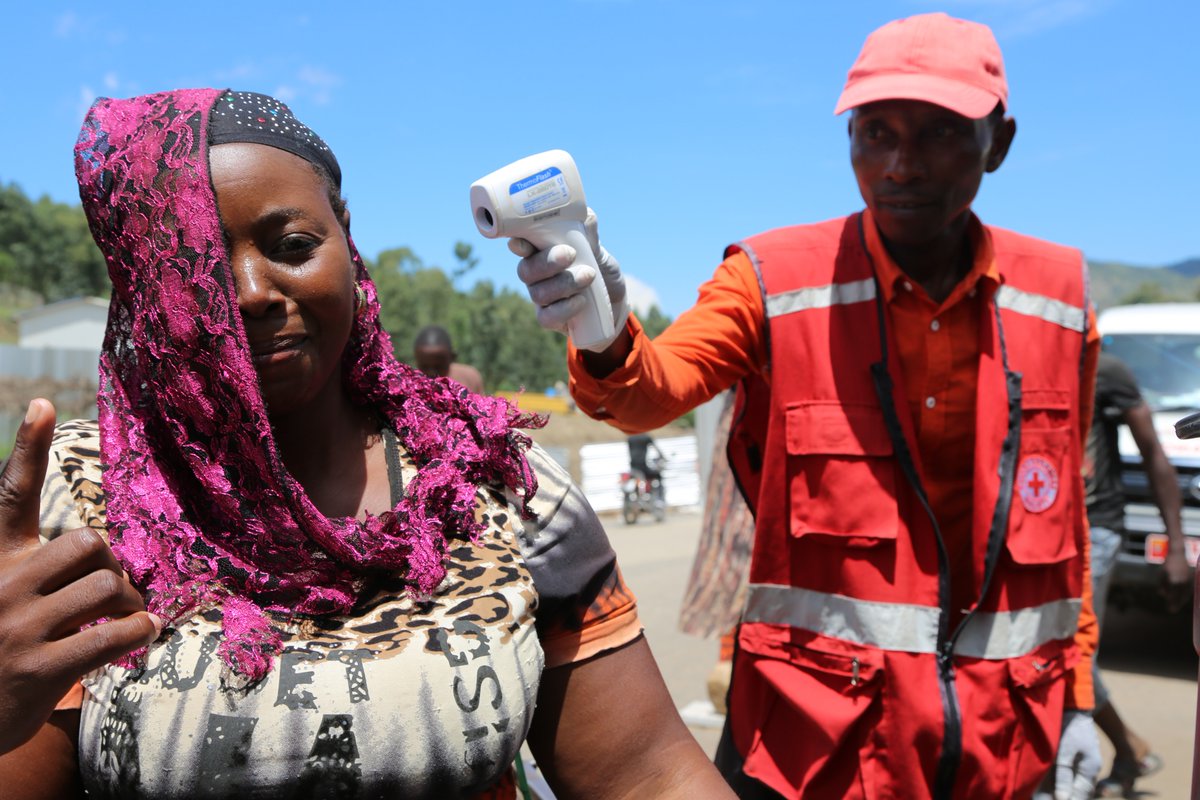
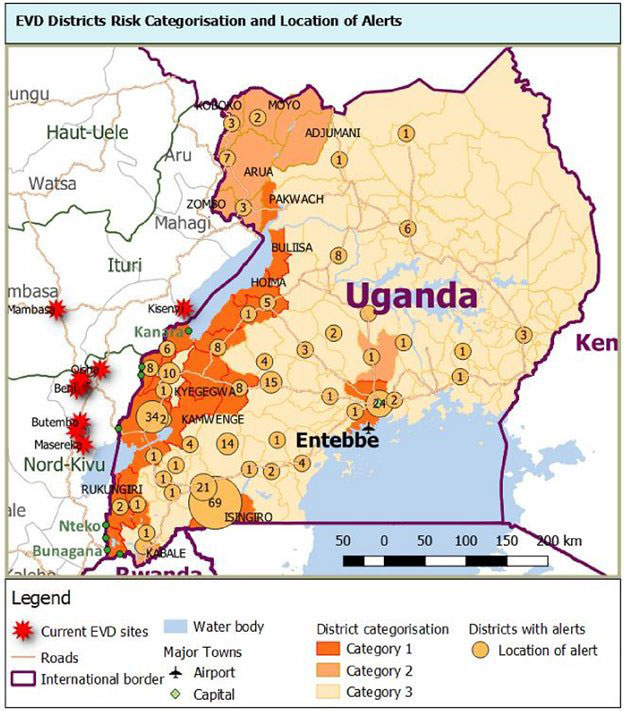
Uganda’s ministry of health said they will begin ring vaccination against Ebola of contacts of the case and frontline health and other workers on Friday 14th June 2019.
Battle against virus
The DRC has struggled to contain the outbreak which was first recorded in North Kivu province on August 1 and then spread to neighbouring Ituri and has left over 1,300 dead.
Efforts to tackle the crisis have been hampered both by militia attacks on treatment centres and by the hostility of some local people to the medical teams.
Five workers have been killed, according to an AFP tally, and important preventative work, such as vaccination programmes and burials of Ebola victims, has been delayed.
The outbreak is the 10th in Democratic Republic of Congo since the disease was identified in 1976.
Measles threat looms
Health authorities in Ebola-hit Democratic Republic of Congo have meanwhile declared an epidemic of measles which may have killed 1,500 people, according to statistical analysis.
“We have been seeing an increase in the number of suspected cases of measles since the start of the year, with a total of 87,000 suspected cases” reported by mid-May, Health Minister Oly Ilunga Kalenga said Monday.
“Mortality is estimated at 1.8 percent,” he said.
This rate translates to about 1,500 deaths, the health ministry and aid agency Doctors Without Borders (MSF) estimated.
The minister said medical teams had found cases of measles in 23 out of 26 provinces in the vast central African country.
*****
Additional reporting by AFP
 The Independent Uganda: You get the Truth we Pay the Price
The Independent Uganda: You get the Truth we Pay the Price

